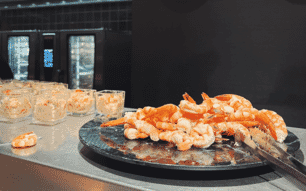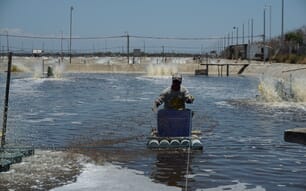
Thousands of jobs could be lost if the matter is not swiftly resolved © Shrimp Club Indonesia
In early August, US regulators flagged traces of radioactive material on the exterior of a factory in Banten operated by BMS Food, one of Indonesia’s largest seafood processors. The discovery prompted an immediate ban on BMS-processed shrimp exports to the US, covering all three of its plants, including those in Medan (North Sumatra) and Makassar (Sulawesi), despite only the plant in Banten (near Jakarta) being implicated.
However, shrimp farmers argue the contamination did not come from shrimp or farms at all – they point out that tests carried out by Indonesia’s nuclear agency (BAPETEN) and fisheries ministry showed no trace of radiation in shrimp ponds, feed, water, or hatcheries. Instead, low-level contamination was found on packaging and factory surroundings, which they believe was likely to have come from emissions from a neighbouring iron and steel smelter that released radioactive dust into the air.
“Shrimp itself is completely safe. There is no radioactive contamination in the farms or in the shrimp,” a spokesperson for Shrimp Club Indonesia told The Fish Site, during a meeting at this week’s Global Shrimp Forum, pointing out that the detected levels were well below the FDA’s legal intervention threshold and that even bananas naturally carry more radiation than what was detected in the Banten facility.
The most frustrating part for many of the nation’s farmers is that the US export ban has been applied to all BMS facilities, including those 3,000–4,000 kilometres away from the contaminated site. Farmers say this blanket action is devastating small-scale producers in Sumatra and Aceh who rely on BMS’s Medan plant – the only processor within their reach.
With their sole buyer shut down, farmers face grim choices: sell shrimp domestically at a 50–70 percent discount; truck them overland for a week to distant processors – thereby losing the quality of their shrimp; or destroy their harvest entirely.

© Shrimp Club Indonesia
In Aceh and Medan alone, it is estimated that 630 farm owners are being affected, with around 3,500 direct Jobs and 6,000 indirect jobs at stake.
“Many farmers have already closed their ponds,” one farmer said. “They don’t farm for fortune; they farm to survive. If this continues, thousands will lose their livelihoods.”
Industry groups are now pressing Jakarta to act swiftly. While they acknowledge that the radiation issue is serious, they want the government to isolate the problem to the single contaminated factory and push back against foreign regulators, making clear that the rest of Indonesia’s shrimp industry is safe.
“Both the Indonesian government and the shrimp industry acknowledge the seriousness of this incident and are committed to implementing preventive and corrective measures to ensure it will never recur. This includes strengthening monitoring, improving coordination across agencies, and reinforcing international food safety protocols. The case should also serve as a wake-up call for the global shrimp supply chain: robust and transparent food safety systems are essential everywhere, not just in Indonesia, to maintain consumer trust and protect international trade,” said the spokesperson.
But bureaucratic delays are slowing the official response. Despite investigations concluding weeks ago, farmers complain that ministries are bogged down in internal discussions instead of acting decisively to resolve the issue with the US Food and Drug Administration (FDA).
“The FDA will only act if our government explains the root cause,” one industry leader explained. “Until then, the perception is that Indonesian shrimp is radioactive – which is simply not true.”
For thousands of small-scale shrimp farmers in Aceh, Medan and beyond, the stakes are high. Without decisive government action to reopen unaffected processing facilities, an industry that sustains entire coastal communities risks collapse.
“The message is simple,” farmers say. “Isolate the problem to the one factory. Don’t punish the whole industry for something it didn’t cause.”







